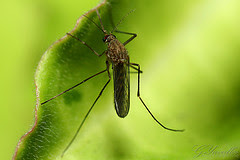Wireless access to the network from Google
We are launching a large-scale project to provide wireless broadband Internet access for the majority of Russian users. So far, there are relatively few places where the existing infrastructure for providing access to data networks exists. Therefore, we are creating our own peer-to-peer network based on a set of autonomous microtransmitters that can automatically organize themselves into one or another infrastructure. To do this, a technology similar to ZigBee and similar networks ( mesh networks ) will be used.
To locate the transmitters and distribute them around the area, the most mobile sites were selected, namely Culex Pipiens (one of the device modifications in the photo, by Gerald Yuvallos ).

')
Thanks to their ubiquitous distribution, Internet access will be provided anywhere in Russia.
Software transmitting devices will automatically calculate the most profitable data transmission routes from one such device to another and adjust them depending on the quality of communication and network configuration.
In particular, we have already provided for a procedure for restoring communication in the event of the loss of one of the nodes (as usual, we are counting on massive use of relatively cheap devices, this technique has already recommended itself). Further improvements in the quality of data transmission include, for example, the use of landscape features to increase throughput and connection reliability.
Of course, a project of this magnitude is impossible without the participation of highly qualified engineers and programmers. Therefore, if you are interested in solving such problems, come to us . We especially need specialists familiar with Mosquito Lisp , so if you have worked with this language - do not forget to mention it in the resume, it will delight us all!
Maxim Ushakov, Google Russia Engineer
a source
To locate the transmitters and distribute them around the area, the most mobile sites were selected, namely Culex Pipiens (one of the device modifications in the photo, by Gerald Yuvallos ).

')
Thanks to their ubiquitous distribution, Internet access will be provided anywhere in Russia.
Software transmitting devices will automatically calculate the most profitable data transmission routes from one such device to another and adjust them depending on the quality of communication and network configuration.
In particular, we have already provided for a procedure for restoring communication in the event of the loss of one of the nodes (as usual, we are counting on massive use of relatively cheap devices, this technique has already recommended itself). Further improvements in the quality of data transmission include, for example, the use of landscape features to increase throughput and connection reliability.
Of course, a project of this magnitude is impossible without the participation of highly qualified engineers and programmers. Therefore, if you are interested in solving such problems, come to us . We especially need specialists familiar with Mosquito Lisp , so if you have worked with this language - do not forget to mention it in the resume, it will delight us all!
Maxim Ushakov, Google Russia Engineer
a source
Source: https://habr.com/ru/post/7924/
All Articles